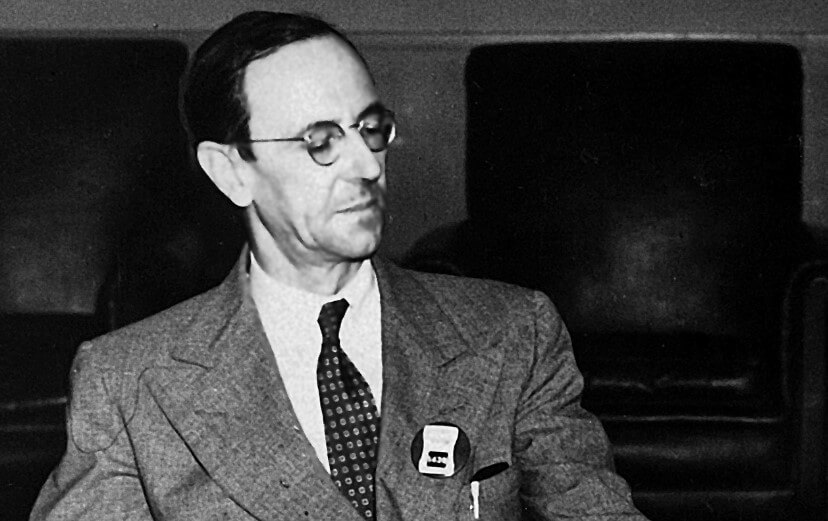Explore the groundbreaking contributions of James Chadwick, a British physicist awarded the Nobel Prize in Physics in 1935 for discovering the neutron. Chadwick’s work revolutionized our understanding of atomic nuclei, paved the way for nuclear theories, and played a crucial role in the Manhattan Project during World War II.

Source: wikipedia.org
James Chadwick; (1891-1974), British physicist, who was awarded the Nobel Prize in physics in 1935 for the discovery of the neutron. In 1946 he received the U. S. Medal for Merit for his contribution to the successful outcome of the U. S. wartime Manhattan Project, on which he had led the British team. He received the Copley Medal in 1950 and the Franklin Medal in 1951, and was knighted in 1945.
Chadwick was born in Manchester on Oct. 20, 1891, and was educated at the universities of Manchester, Berlin, and Cambridge. At Manchester he studied under Ernest Butherford, and after Rutherford had moved to the Cavendish professorship at Cambridge (1919), Chadwick rejoined him there. Eventually he took over from Rutherford the exacting task of directing most of the experimental research in nuclear physics carried out in the laboratory during its most fruitful period, from 1925 to 1935. Chadwick was professor of physics at the University of Liverpool (1935-1948) and master of Gonville and Caius College, Cambridge (1948-1958). He died in Cambridge, England, on July 24, 1974.
Chadwick’s discovery of the neutron in 1932 marked the beginning of the modern era in the experimental study and theoretical understanding of the atomic nucleus. As a young student in Berlin (1914), he had been the first to obtain the energy spectrum of the beta particles from radioactive substances, thus posing the problem that led Wolfgang Pauli to postulate the existence of the neutrino in 1931. In 1920, Chadwick was the first to determine the electric charge on the nucleus by an absolute measurement of alpha particle scattering. His work in collaboration with Rutherford was mainly in the field of artificial nuclear transmutation, using alpha particles as projectiles. Rutherford had been the first to detect such an effect, with nitrogen, in 1919. Later, with his own students, Chadwick continued this work and investigated nuclear transmutations produced by neutrons and gamma rays.
Contribution to science
James Chadwick, a British physicist, made a significant contribution to science with his discovery of the neutron. Here are the key aspects of his contribution:
Discovery of the Neutron (1932): Chadwick’s most notable contribution came in 1932 when he confirmed the existence of the neutron, a neutral subatomic particle located in the atomic nucleus. This discovery was crucial in understanding the structure of atoms. Prior to Chadwick’s work, scientists knew of positively charged protons and negatively charged electrons, but there seemed to be a missing neutral component.
Experimental Confirmation: Building upon the work of others, especially Ernest Rutherford, Chadwick conducted a series of experiments involving the scattering of alpha particles by beryllium. The results showed that an uncharged particle was being emitted, and Chadwick concluded that it was a new particle – the neutron. This finding was pivotal for the understanding of nuclear structure and the development of the atomic model.
Implications for Nuclear Physics: Chadwick’s discovery of the neutron had profound implications for nuclear physics. Neutrons, along with protons, are fundamental building blocks of atomic nuclei. The understanding of neutron-proton interactions became essential for the development of nuclear theories and technologies. The neutron’s lack of electric charge also made it a valuable tool for probing atomic nuclei without the complications of electromagnetic interactions.
Nuclear Fission: Chadwick’s work laid the groundwork for later advancements in nuclear physics, including the discovery of nuclear fission. Neutrons, being neutral, could easily penetrate into the nucleus of an atom, and this property played a crucial role in the understanding and utilization of nuclear reactions.
For his groundbreaking work on the neutron, James Chadwick was awarded the Nobel Prize in Physics in 1935. His discovery significantly influenced subsequent developments in nuclear physics, nuclear energy, and our understanding of the fundamental structure of matter.